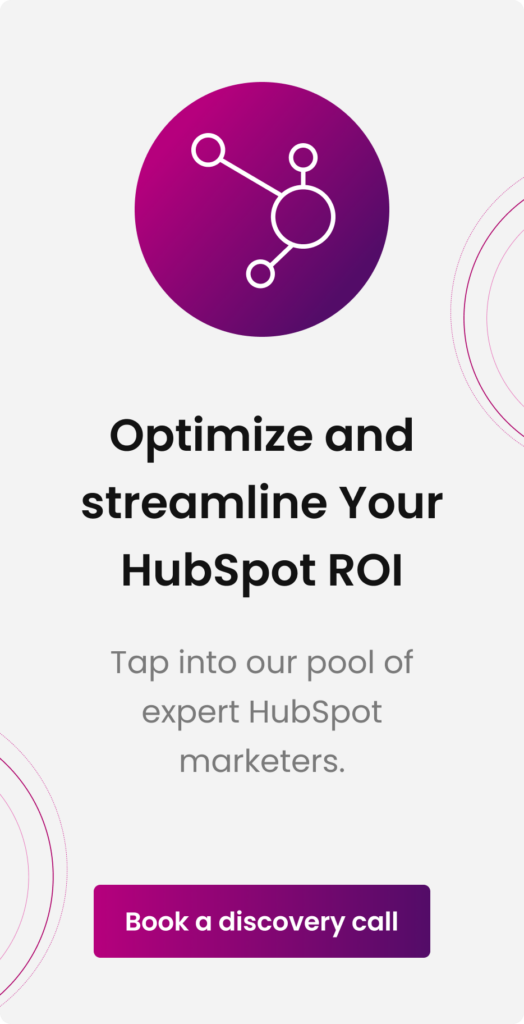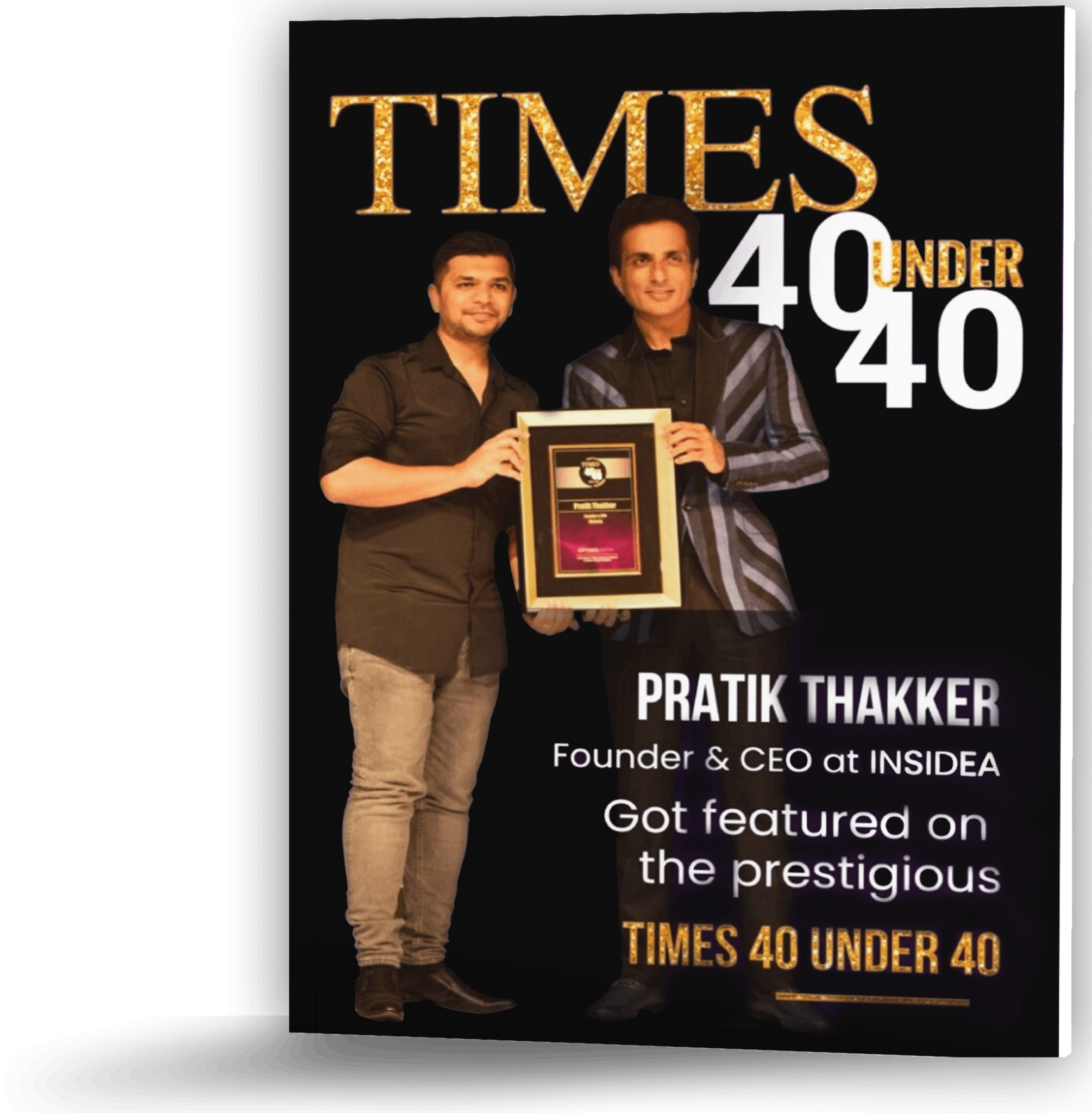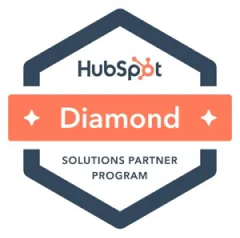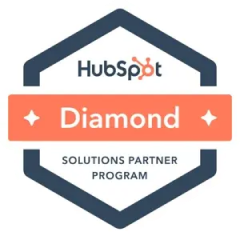In customer relationship management and marketing automation, businesses constantly seek tools that streamline their operations and enhance their engagement with potential customers. HubSpot and Pardot (now known as Marketing Cloud Account Engagement or MCAE) are prominent names in this arena, each offering unique features and capabilities.
Both platforms boast robust analytics and reporting tools, enabling businesses to track and measure the effectiveness of their marketing campaigns. However, their approach and specific offerings differ, making choosing between HubSpot and Pardot a critical decision for businesses aiming to optimize their marketing strategies and CRM practices.
As we explore the features of HubSpot vs Pardot in this blog, we aim to provide a clear, objective comparison, helping you understand which platform aligns best with your business needs and goals.
What is HubSpot?
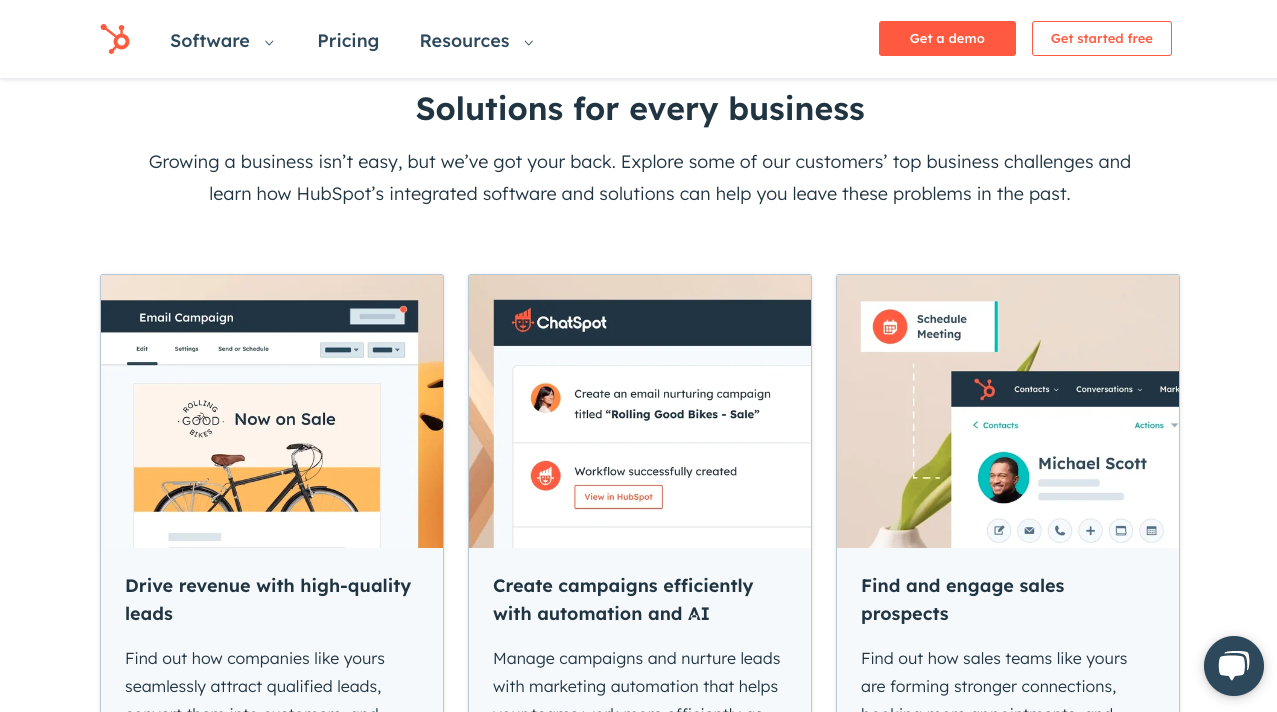
Source: HubSpot
HubSpot is a highly accessible and versatile CRM platform catering to large and small organizations. Its popularity stems from its user-friendly interface and affordability, making it an ideal choice for many businesses.
HubSpot provides essential CRM features such as contact management, pipeline management, live chat, meeting scheduling, and prospect tracking. These core functionalities are crucial for businesses looking to maintain efficient customer relationships and streamline their sales processes.
What is Pardot?
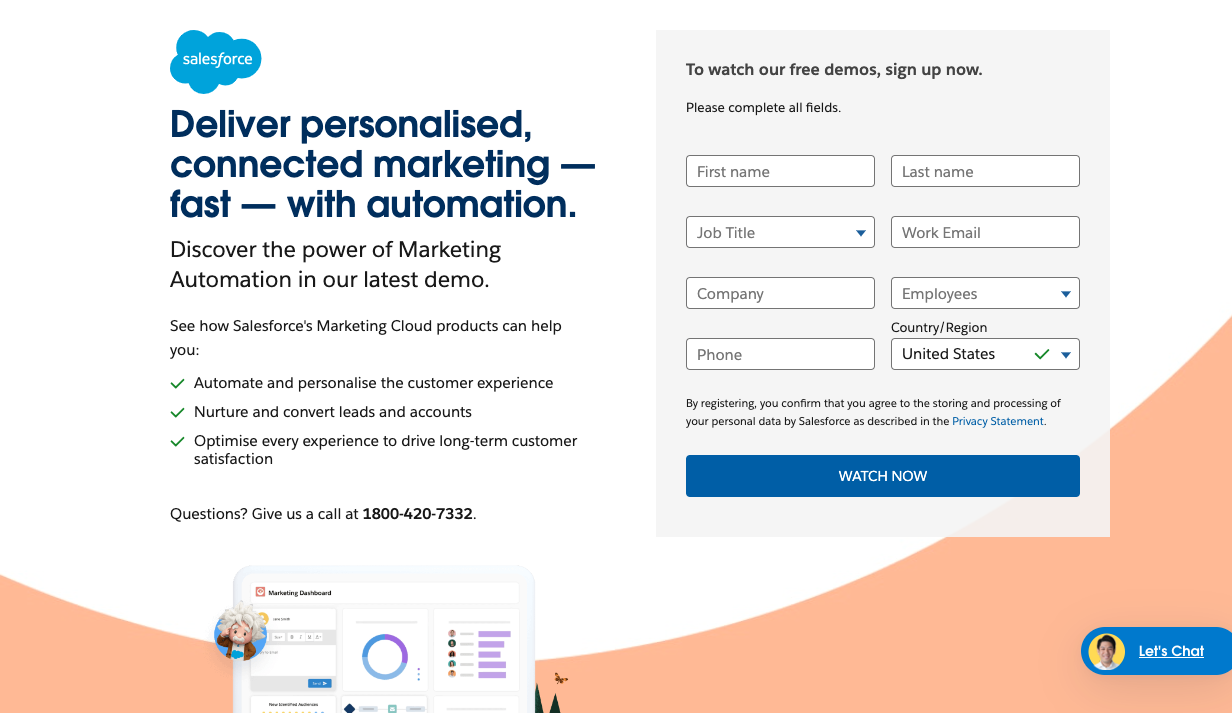
Source: Salesforce
Pardot, now known as Marketing Cloud Account Engagement (MCAE), is a sophisticated B2B marketing automation tool that stands out for its advanced lead management and customer journey mapping capabilities.
Acquired by Salesforce in 2012, Pardot/MCAE has become a popular choice in the business and consumer service industry, holding a significant market share.
This platform is particularly tailored for businesses integrated with Salesforce CRM, offering seamless compatibility and enhanced functionality within the Salesforce ecosystem. Pardot/MCAE’s strength is facilitating engaging and effective marketing strategies for B2B companies.
Users can utilize the platform to find, assess, and utilize dynamic marketing data, enhancing their overall marketing efforts.
HubSpot vs Pardot: A Detailed Feature Comparison
In marketing automation, HubSpot and Pardot (now Salesforce Marketing Cloud Account Engagement, MCAE) are two leading platforms offering a range of features to streamline marketing efforts. This comparison aims to dissect their functionalities, providing insights into how each platform can cater to different business needs.
Let’s understand the HubSpot vs Pardot comparison and see which is the best fit for your business:
I. Integrations
HubSpot
- Vast App Marketplace: HubSpot’s App Marketplace includes over 1,000 integrations, covering a broad spectrum of functionalities.
- Diverse Tool Compatibility: Integrates with tools across marketing, sales, customer service, and more, making it highly adaptable to various business needs.
- Ease of Management: The integrations are designed to work seamlessly with HubSpot, simplifying the management of different tools and data sources.
- Customization and Flexibility: Offers the flexibility to customize the platform according to specific business processes and workflows.
Pardot
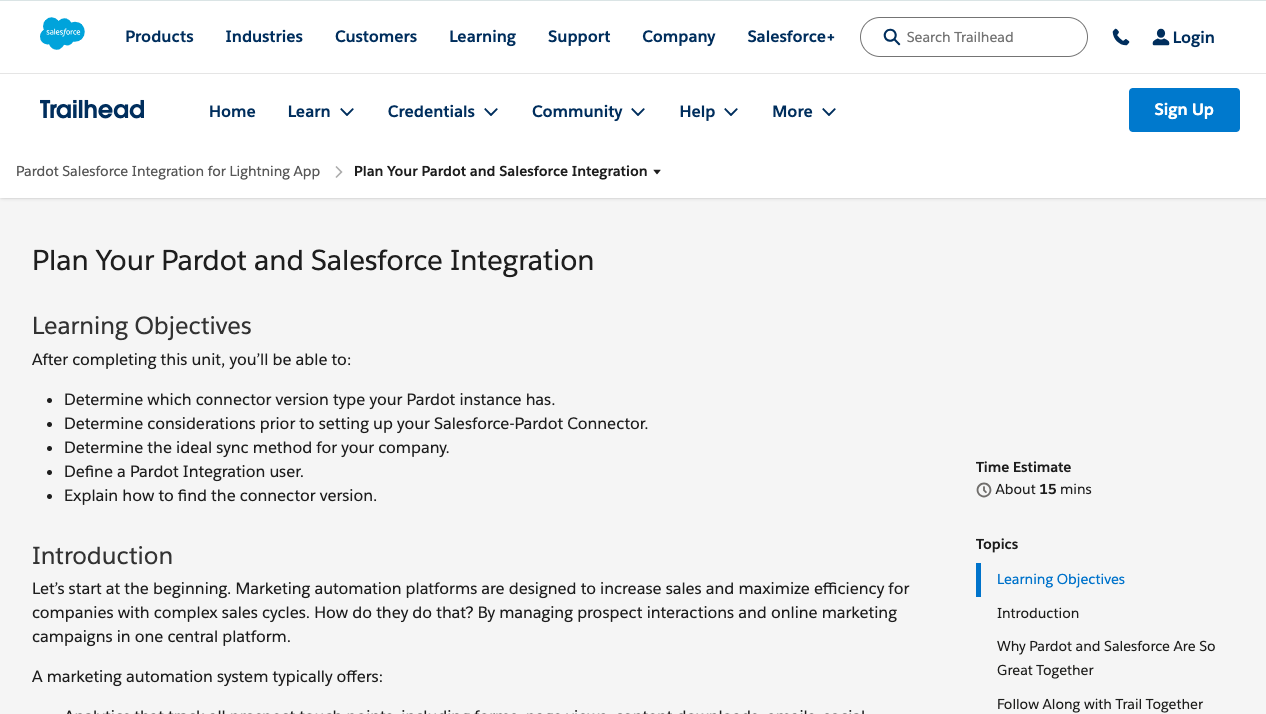
Source: Pardot
- Salesforce Synergy: Being a Salesforce product, Pardot integrates deeply with Salesforce CRM, offering a cohesive experience for users of both platforms.
- Focused Integrations: Primarily integrates with Salesforce products, which highly benefits businesses already invested in the Salesforce ecosystem.
- Third-Party Tool Integration: Supports integrations with popular third-party tools like webinar platforms and Google Analytics, enhancing its marketing capabilities.
- Streamlined Data Flow: The integration with Salesforce ensures a simplified data flow between marketing and sales, aiding in better lead management and conversion tracking.
In the HubSpot vs Pardot comparison, HubSpot is the go-to choice for businesses seeking various integrations across various functionalities. Its extensive App Marketplace suits companies requiring a broad spectrum of marketing, sales, and customer service tools.
If your business prioritizes ease of management and customization in integrating various tools, HubSpot stands out as the more adaptable and user-friendly option.
However, Pardot is the clear winner for businesses deeply invested in the Salesforce ecosystem. Its seamless integration with Salesforce CRM offers a unified and efficient experience, particularly beneficial for lead management and data flow between sales and marketing.
II. Email Marketing
HubSpot
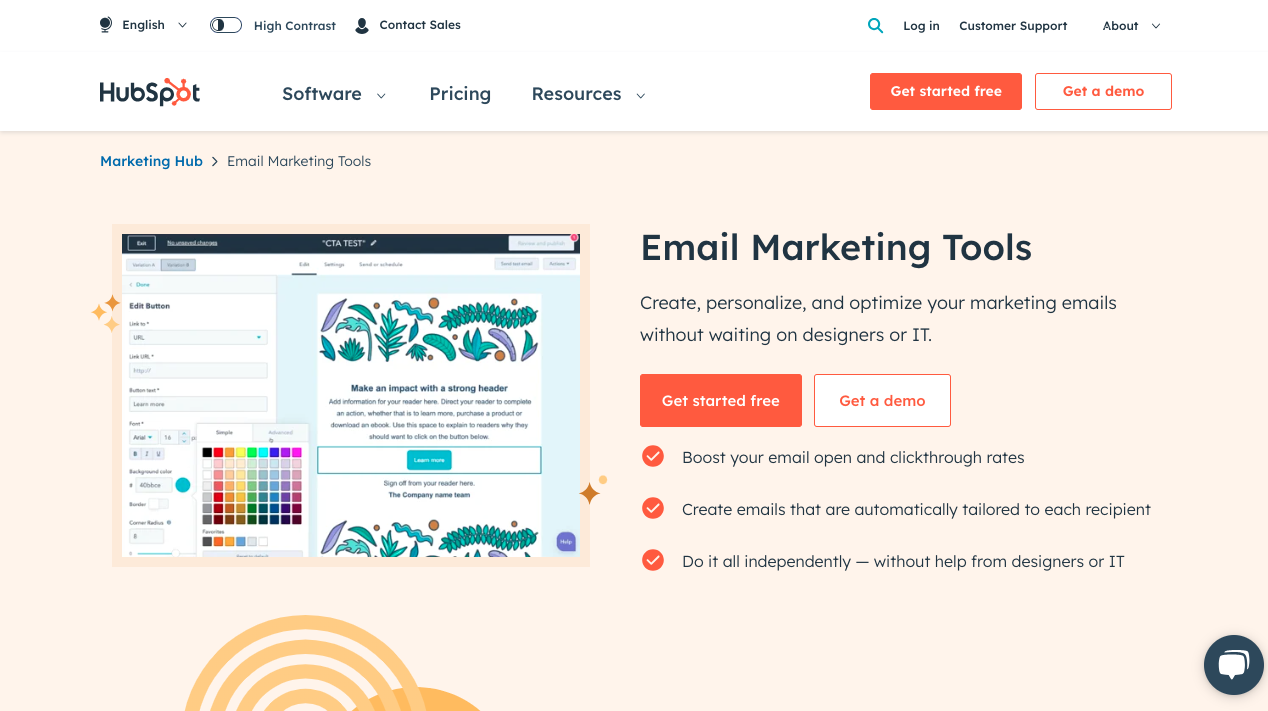
Source: HubSpot
- Advanced Features: HubSpot’s email marketing tool includes A/B testing, allowing businesses to test different versions of their emails to see which performs better.
- Segmentation and Personalization: Offers robust segmentation capabilities, enabling businesses to target specific groups of customers with personalized content.
- Automation: Automates repetitive tasks like drip campaigns and triggered emails, saving time and ensuring timely customer engagement.
- Detailed Reporting: Comes with comprehensive reporting tools that provide insights into email campaign performance, helping businesses refine their strategies.
Pardot
- Customizable Email Templates: Offers a range of bespoke email templates, giving businesses the flexibility to create branded and visually appealing emails.
- Dynamic Content: Allows dynamic email content, enabling more targeted and relevant messaging to different audience segments.
- Audience Targeting: Provides tools for precise audience targeting based on various criteria, enhancing the effectiveness of email campaigns.
- Performance Analytics: Includes robust analytics and reporting capabilities, giving detailed insights into campaign metrics like open rates, click-through rates, and conversions.
The HubSpot vs Pardot comparison reveals that HubSpot provides advanced email marketing features, including A/B testing, segmentation, and automation. It is ideal for businesses creating highly personalized and effective email campaigns with the added benefit of detailed performance analytics.
Pardot is the better option for businesses that require highly customizable email templates and dynamic content capabilities. Its strength in audience targeting and detailed performance analytics makes it a strong contender for companies focusing on precision in their email marketing strategies.
III. Lead Management
HubSpot
![]()
Source: HubSpot
- Content Marketing Tools: HubSpot provides tools for creating and managing blogs, landing pages, and calls-to-action (CTAs), which are crucial for attracting leads.
- Lead Categorization: Allows for detailed segmentation and categorization of leads, helping businesses effectively tailor their marketing efforts.
- Interaction Tracking: Tracks historical interactions with leads, providing a comprehensive view of each lead’s journey and engagement with the business.
- User-Friendly Interface: Known for its intuitive and easy-to-use interface, making lead management accessible even for those with limited technical expertise.
Pardot
- Lead Scoring and Nurturing: Offers advanced lead scoring capabilities, helping businesses prioritize leads based on engagement levels.
- Email and Landing Page Creation: Provides tools for creating targeted emails and landing pages, essential for capturing and nurturing leads.
- Salesforce Integration: Seamlessly integrates with Salesforce CRM, ensuring that lead data is consistently and accurately shared between marketing and sales teams.
- Website Tracking: Tracks website visits and interactions, offering valuable insights into lead behavior and preferences.
In the HubSpot vs Pardot comparison, HubSpot is the superior choice for businesses that rely heavily on content marketing to attract leads. Its comprehensive tools for managing blogs, landing pages, and CTAs, combined with user-friendly lead categorization and interaction tracking, make it ideal for companies focusing on inbound marketing strategies.
Pardot excels in lead scoring and nurturing, making it the preferred option for businesses that prioritize these aspects in their lead management process. Its deep integration with Salesforce CRM and website tracking capabilities provides valuable insights for businesses looking to align their sales and marketing efforts closely.
IV. Pricing
HubSpot
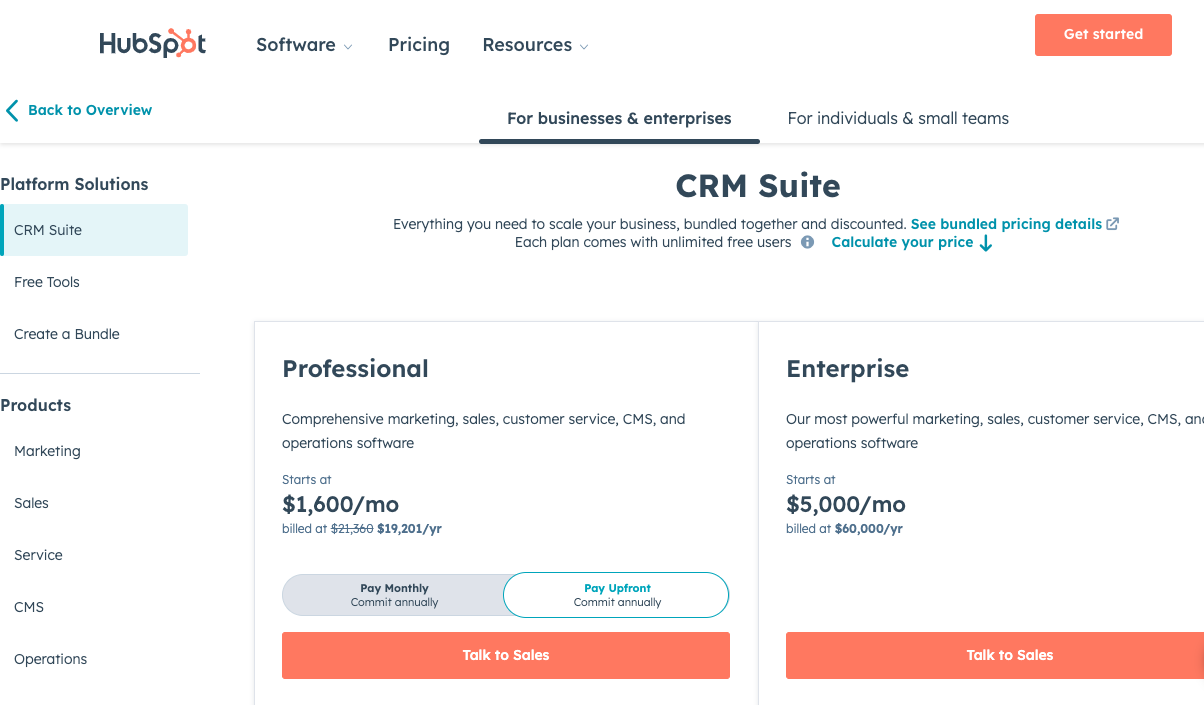
Source: HubSpot
- Flexible Pricing Plans: Ranges from $50 per month for the Starter plan to $3,200 per month for the Enterprise plan, catering to businesses of various sizes.
- Free CRM Option: A free CRM with limited features is suitable for small businesses or those just starting with CRM software.
- Scalability: Allows businesses to scale up as they grow, with plans that accommodate increasing needs and complexity.
- Additional Costs: Be aware of potential additional costs for extra contacts or premium features.
Pardot
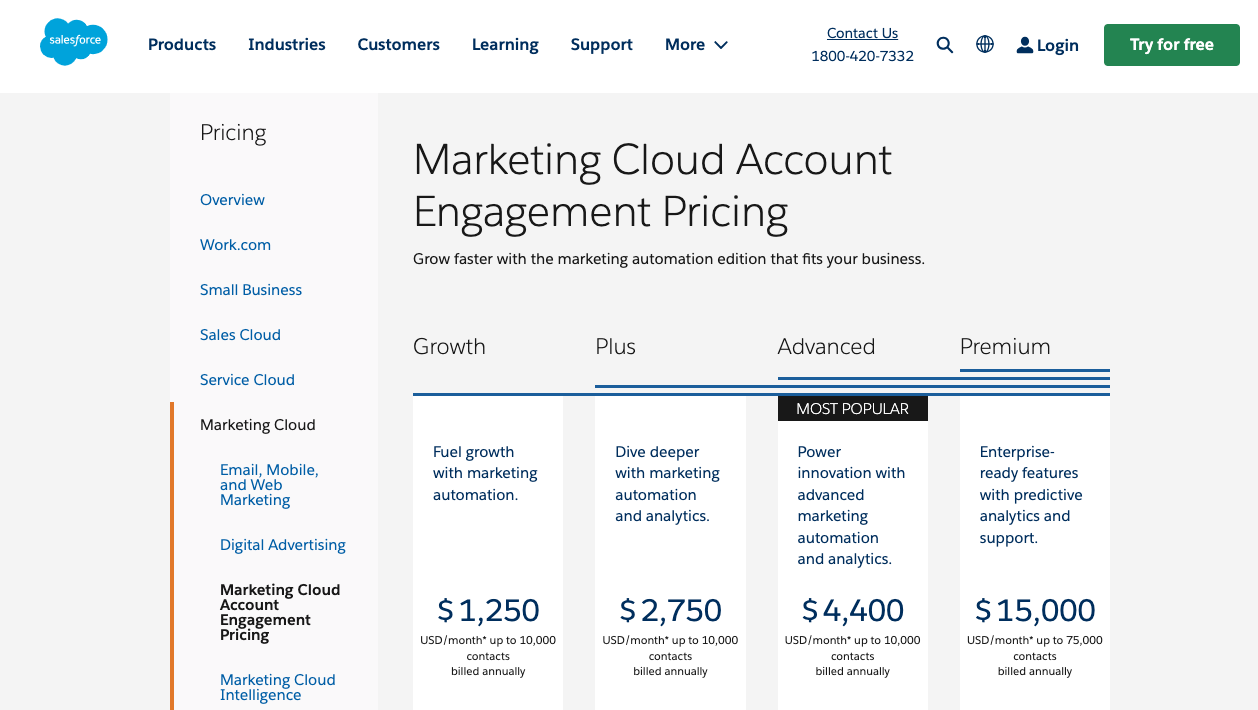
Source: Salesforce
- Higher Price Point: Starts at $1,250 monthly for the Growth plan, making it a more significant investment, especially for smaller businesses.
- Advanced Plan Options: The Advanced Plan ranges to $15,000 monthly and is designed for larger enterprises with extensive marketing needs.
- Contact Limits: Each plan has varying contact limits, which can impact the overall cost for businesses with large databases.
- Salesforce Integration: This is ideal for businesses already using Salesforce CRM, as the integration can justify the higher cost.
The HubSpot vs Pardot comparison reveals that HubSpot’s range of pricing plans from $50 to $3,200 per month, along with a free CRM option, makes it a versatile choice for businesses of all sizes. It’s particularly suitable for those who need scalability and are mindful of budget constraints but should be aware of potential additional costs.
Pardot’s pricing, starting at $1,250 per month and going up to $15,000, positions it as a more suitable option for larger enterprises or businesses with more extensive marketing needs. The higher price point is justified for companies fully leveraging its advanced features and Salesforce integration.
V. Content Management and Social Media Marketing
HubSpot
- Comprehensive CMS: HubSpot’s CMS is designed for ease of use, allowing businesses to publish and manage content across various channels efficiently.
- Multi-Channel Publishing: Enables publishing on websites, blogs, and more, with tools to optimize content for each platform.
- Social Media Suite: Includes a full suite for social media management, allowing scheduling, posting, and tracking performance across multiple social networks.
- Performance Tracking: Offers detailed analytics for social media campaigns, helping businesses understand audience engagement and effectiveness.
- User-Friendly Interface: Known for its intuitive design, making it easy for users to create, manage, and publish content without needing extensive technical skills.
Pardot
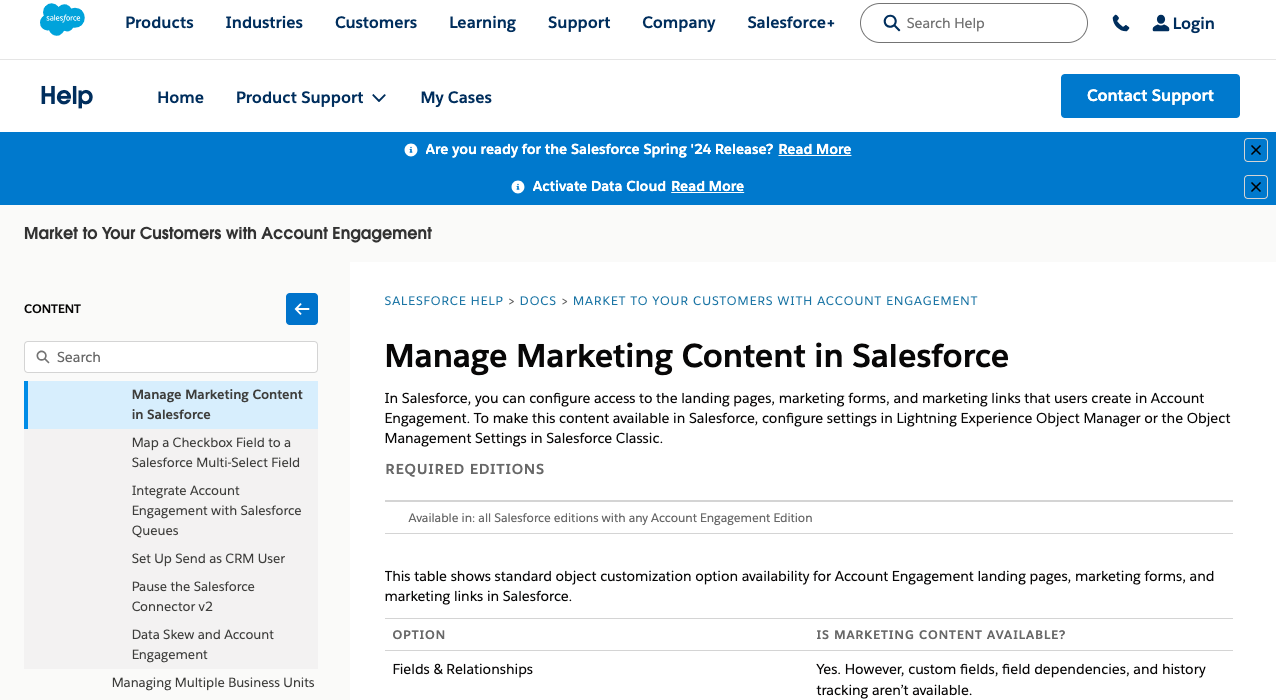
Source: Salesforce
- Webpage Creation: Pardot’s CMS focuses more on creating and managing webpages, particularly useful for landing pages and email campaign content.
- Limited Social Media Tools: Offers basic social media marketing tools less comprehensive than HubSpot’s offerings.
- Integration with Salesforce: Benefits from its integration with Salesforce, particularly in aligning content management with customer data and insights.
- Focused on B2B: More tailored for B2B companies, with tools and templates suited for this market.
When weighing HubSpot vs Pardot, opt for HubSpot if your enterprise demands a robust content management system coupled with powerful social media marketing tools. HubSpot stands out for entities engaging in diverse content strategies across multiple channels and prioritizing social media interaction.
On the other hand, in the HubSpot vs Pardot comparison, select Pardot if your core emphasis is on crafting webpages and you need a content management system that seamlessly meshes with Salesforce, particularly beneficial for businesses with a strong B2B focus.
VI. Scalability and Customization
HubSpot
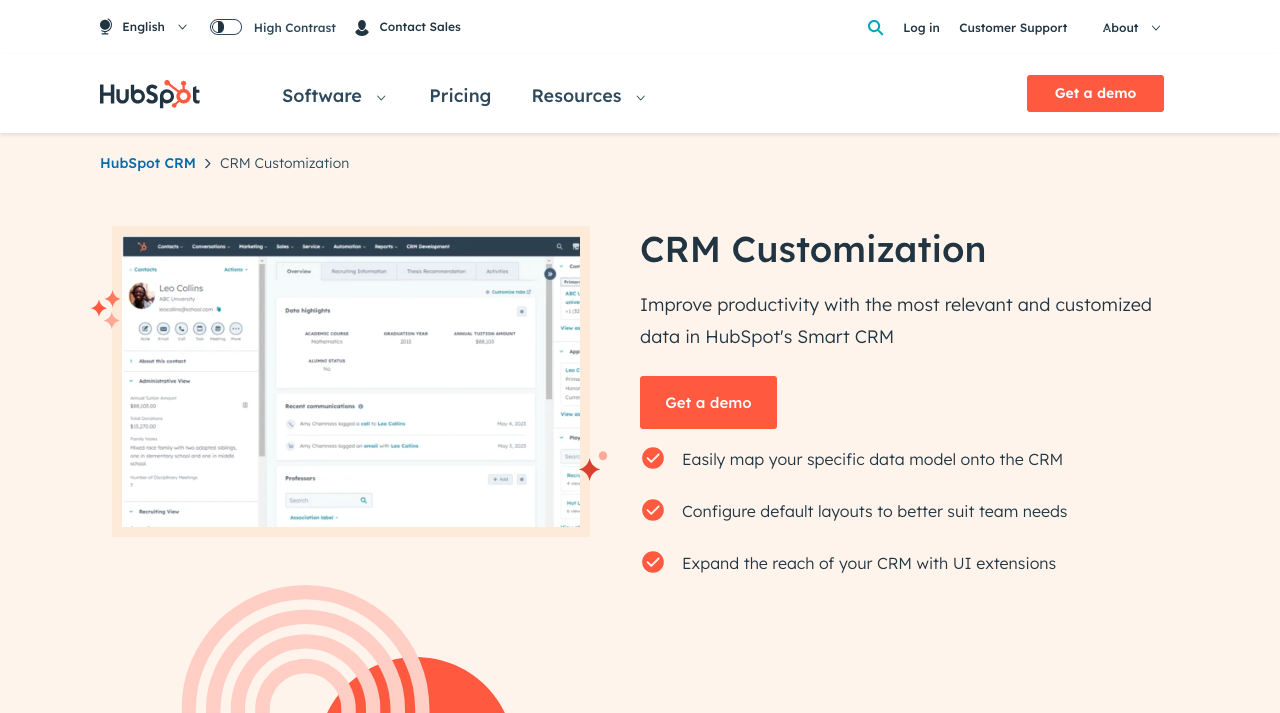
Source: HubSpot
- Automated Workflow Management: Provides tools for automating marketing processes, making it easier to scale operations as the business grows.
- Robust Analytics: Offers powerful analytics tools to track and measure the effectiveness of marketing strategies, aiding in decision-making.
- Customization Capabilities: Allows extensive customization through its CMS and integration with various third-party applications.
- Scalable for Different Business Sizes: Suitable for businesses of all sizes, with features and tools that can grow with the company.
Pardot
- Dynamic Content Personalization: Features advanced options for personalizing content, enhancing the relevance and effectiveness of marketing campaigns.
- Advanced Segmentation: Offers sophisticated segmentation tools, allowing for targeted marketing efforts and efficient resource allocation.
- Customization Options: Provides customization for emails, landing pages, and digital assets, catering to specific marketing needs.
- Scalable for Larger Operations: Particularly effective for larger businesses or those with complex marketing needs, especially within the Salesforce ecosystem.
In the HubSpot vs Pardot debate, select HubSpot for a scalable solution that evolves alongside your business, providing comprehensive analytics and a wide range of customization possibilities. It’s an ideal choice for businesses of different scales seeking a flexible and intuitive platform.
Conversely, in the context of HubSpot vs Pardot, lean towards Pardot for its superior content personalization and segmentation features, particularly if you’re operating a larger enterprise or are deeply integrated with the Salesforce ecosystem.
HubSpot vs Pardot: Which Platform Drives Your Business Results?
In the HubSpot vs Pardot Comparison, the following table provides a quick glance at the strengths and limitations of each platform, helping you to easily identify which CRM and marketing automation tool aligns best with your business requirements.
| Feature | HubSpot | Pardot (MCAE) |
| User-Friendly Interface | ✅ | ❌ |
| Comprehensive CRM Features | ✅ | ❌ |
| Advanced Lead Management | ❌ | ✅ |
| B2B Marketing Focus | ❌ | ✅ |
| Extensive Integration Options | ✅ | ❌ |
| Salesforce Ecosystem Integration | ❌ | ✅ |
| Content Management Tools | ✅ | ❌ |
| Social Media Marketing Suite | ✅ | ❌ |
| Advanced Email Marketing | ✅ | ✅ |
| Customizable Email Templates | ✅ | ✅ |
| Dynamic Content in Emails | ❌ | ✅ |
| Detailed Reporting & Analytics | ✅ | ✅ |
| Flexible Pricing Plans | ✅ | ❌ |
| Free CRM Option | ✅ | ❌ |
| Scalability for Various Sizes | ✅ | ❌ |
| Automated Workflow Management | ✅ | ✅ |
| Personalization & Segmentation | ❌ | ✅ |
In comparison between HubSpot vs Pardot, consider your specific business needs. HubSpot shines for its user-friendliness, diverse integrations, and strong content management, making it ideal for many businesses, especially those focusing on inbound marketing and scalability. It’s also more accessible for small to medium-sized businesses with its flexible pricing and free CRM option.
Pardot, on the other hand, is better suited for businesses that are deeply integrated with Salesforce, excelling in B2B marketing with advanced lead management features. Ultimately, HubSpot is generally the more versatile for varied business needs, while Pardot is tailored for Salesforce-centric, B2B-focused enterprises.
Unlock Your Business Potential With Expert HubSpot Support!
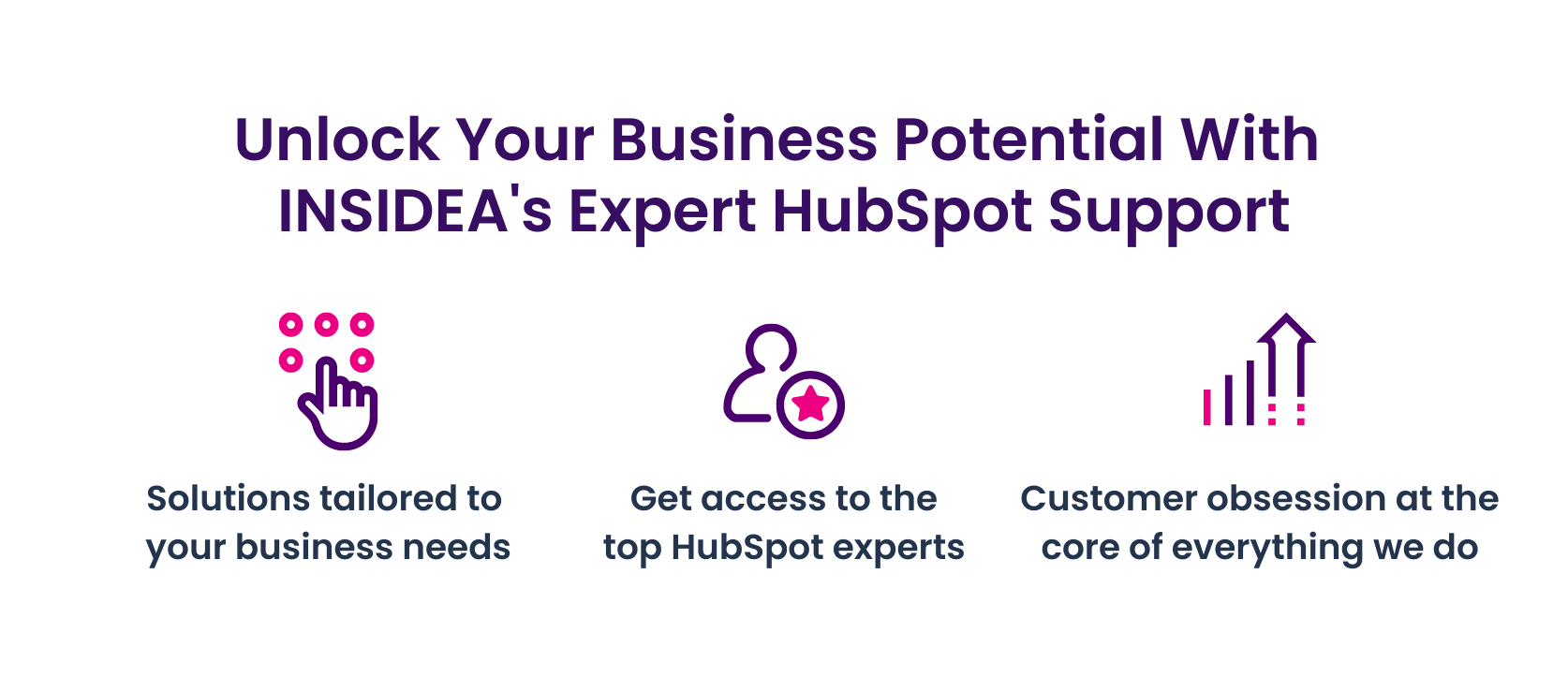
As a HubSpot Solutions Partner we take pride in assisting you with streamlining your HubSpot efforts. With our best-in-class marketing, sales, and service solutions, we help you scale exponentially.
INSIDEA’s HubSpot Specialists have the required in-depth knowledge and can provide you with expert guidance on how to use the platform to meet your specific business needs.
Get in touch today to learn more about how INSIDEA can help you succeed!
- Tailored Experience: For us, user experience is the primary focus. Thus, INSIDEA works with you to ensure your HubSpot experience is tailored to your business needs.
- Industry Expertise: Our team specializes in the setup, implementation, and optimization of HubSpot tools, as well as being well-versed in HubSpot best practices to ensure your business has the highest ROI possible.
- Customer Obsession: For us, customer satisfaction is the key to success, and we strive to ensure that our customers’ needs are not only met but exceeded every time.
At INSIDEA, we understand the importance of valuable HubSpot strategies that understand your target audience and drive conversions. Book a meeting with our HubSpot experts to explore how we can help you with your upcoming projects.
Get started now!





